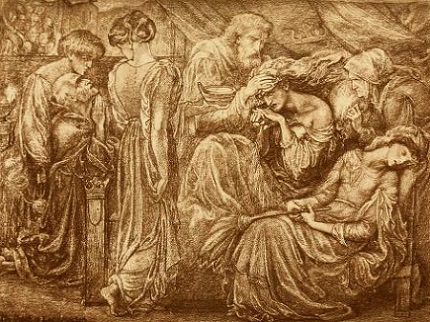| directory |
| home | contact |
|
|||||||||||||||
| search | |||||||||||||||
MacbethPlease see the bottom of the page for full explanatory notes and helpful resources.
Next: Macbeth, Act 5, Scene 6 ______ Explanatory Notes for Act 5, Scene 5 From Macbeth. Ed. Thomas Marc Parrott. New York: American Book Co. (Line numbers have been altered.) ______ In this scene more perhaps than in any other of the play the poet arouses our sympathy for Macbeth. Deserted by his followers, forced to await the attack of his enemies instead of meeting them "dareful, beard to beard," he is plunged into still greater misery by the news of his wife's sudden death. He even seems to contemplate suicide, when the shock of the messenger's report brings him back to himself. He begins at last to realize that the powers of evil have been deceiving him, and with a sudden resolution to trust henceforth to the- strength of his own arm and to die, if needs be, with harness on his back, he sallies out to meet the foe. It is worth noting how little is said of Lady Macbeth. We hear the cry of her women and the brief report of her death, — nothing more. Shakespeare wishes at this point to concentrate all our interest and sympathy on the hero of the drama. It is not the manner of Lady Macbeth's death, but the way in which it affects her husband that he wishes us to notice. 14. slaughterous thoughts, thoughts of bloodshed. Please click here for full soliloquy annotations and analysis. 17, 18. She should ... word, she must have died sometime; there must have come a time for such an announcement. This speech of Macbeth's does not show callous indifference to his wife's death, as some critics have supposed. It rather shows him so sunk in misery that he thinks life not worth living. He can hardly grieve for his wife's death; sooner or later she must have died, and what does it matter whether early or late? The following lines continue the same train of thought. 22. lighted, guided, as a servant with a torch guides his master. 23. Out ... brief candle. Dr. Liddell suggests that these words show that Macbeth is on the point of killing himself. 24. a walking shadow, a flitting unreality. 31. should report, am bound to report to you. 42. pull in resolution, check my courage. Such, at least, is the meaning of the words as they stand. Various emendations have, however, been proposed, of which "pall" i.e. "languish," "grow weak" is the most plausible. 43. To doubt ... fiend, to fear that the devil (who inspired the witches when they uttered their predictions) has been equivocating with me. 46. arm, and out. In his rage at having been deceived by the "fiend," Macbeth abandons his prudent plan of permitting the enemy to waste their strength in a vain siege, and sallies out to meet them. This act throws away his last chance, for it gives his men a chance to desert him (see v. 7. 25) and brings him face to face with the man who is destined to slay him. ________ How to cite the explanatory notes:________ More Resources |

More to Explore
| ||||||||||||||||||||||||||||||||||||||||||||||||||||||||||||||||||||||||||||||||||||||||||||||||||||||||||||||||||||||||||||||||||||||||||||||
©1999-2021 Shakespeare Online. All Rights Reserved.